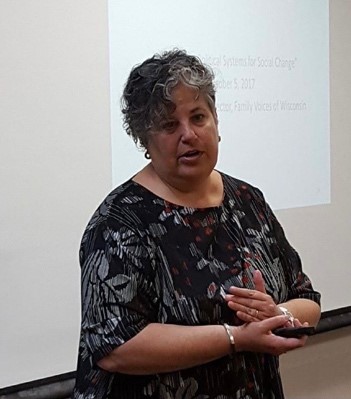Updates on Core Sets of Children’s and Adults’ Health Quality Measures for Medicaid and CHIP
On November 20, the Centers for Medicare & Medicaid Services (CMS) released an informational bulletin that describes the 2019 updates to the core set of children’s health care quality measures (the Child Core Set) for Medicaid and the Children’s Health Insurance Program (CHIP) and the core set of health care quality measures for adults enrolled in Medicaid (the Adult Core Set).
CMS Launches Efforts to Improve Patient Safety, Quality of Care in Nursing Homes
(CMS press release, 11/20/18)
WORTH REPEATING: Proposed Rule on Medicaid/CHIP Managed Care and Network Standards
On November 8, the Centers for Medicare & Medicaid Services (CMS) issued a Notice of Proposed Rule Making (NPRM) (proposed rule) to amend the 2016 managed care final rule issued by the Obama administration. As explained in a CMS Fact Sheet, the new proposed rule would give states “more flexibility to set meaningful network adequacy standards using quantitative standards that can take into account new service delivery models like telehealth.” States would also have the authority to define “specialists” “in the most appropriate way for their programs.” Among other objectives, the proposed rule is intended to make it easier for states to transition new services and populations into managed care. See Medicaid Managed Care Proposed Rule Would Give States More Flexibility (National Academy for State Health Policy, 11/20/18). Comments are due January 14, 2019, and can be submitted through Regulations.gov.
Medicaid § 1115 Waivers
CMS Re-Approves Kentucky “Community-Engagement” Waiver
In a 20-page letter (plus attachments), dated November 20, the Centers for Medicare and Medicaid Services (CMS) notified the Kentucky Medicaid program that it had re-approved the “Kentucky HEALTH” component of the state’s §1115 Medicaid waiver proposal to, among other things, establish “community-engagement” requirements and premium payments for most beneficiaries to maintain Medicaid eligibility. These components of the waiver are effective April l, 2019, through September 30, 2023. CMS had approved the state’s waiver proposal last January, but a federal district court later vacated the approval and remanded it to CMS for further review, based on the rationale that CMS “never adequately considered whether Kentucky HEALTH would in fact help the state furnish medical assistance to its citizens, a central objective of Medicaid.” In July, CMS opened a new 30-day public comment period on the Kentucky proposal, and received nearly 12,000 comments. The CMS re-approval letter addresses these comments, but cited none that were supportive of the waiver.
According to a November 29 issue brief from the Kaiser Family Foundation, the conditions of the new approval are largely the same as the original approval, with a few technical or minor changes. The issue brief explains that the re-approval also includes requirements for the state to submit implementation and monitoring protocols to CMS for approval, as well as some evaluation hypotheses for the work requirement and other provisions. The CMS letter notes, “It is not necessary for a state to show in advance that a proposed demonstration will in fact achieve particular outcomes; the purpose of a demonstration is to test hypotheses and develop data that may inform future decision-making. … The information it yields will provide policymakers real-world data on the efficacy of such policies. That in itself promotes the objectives of the Medicaid statute.” See Scholars Wrangle Over Kentucky’s Medicaid Waiver: Does the Work Requirement Support or Undermine the Program’s Ultimate Purpose? (MedPage Today, 11/27/18).
12K Have Lost Arkansas Medicaid Coverage Over Work Rule
(Associated Press, 11/15/18)
According to the state’s Department of Human Services, Arkansas removed more than 12,000 people from its expanded Medicaid program over the past three months for not complying with a new work requirement, the state said Thursday. Another 6,000 are at risk of losing coverage by December if they don’t find work. In response to this news, CMS Administrator Seema Verma has said she will examine why so many beneficiaries have been disenrolled, but plans to continue approving similar waivers.
Medicaid Resources – worth repeating:
- A Sourcebook on Medicaid’s Role in Early Childhood: Advancing High Performing Medical Homes and Improving Lifelong Health: Child and Family Policy Center, of Des Moines, Iowa
The Sourcebook addresses how Medicaid financing can be used to promote the health and development of low-income young children. Topics include medical homes, developmental screening, home visiting, reimbursement rates and measurement. The Sourcebook is organized to make it accessible and useful to Medicaid administrators, child advocates, health plan leaders and policy makers.
- States Are Using Medicaid To Target Social Needs: (Axios, 10/30/18)


















